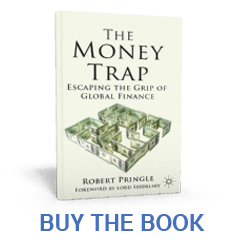Is Europe falling apart?
The geo-political fallout from the financial crisis continues
The triumph of the UKIP (United Kingdom Independence Party) and the National Front in France in the recent European elections is part of the continuing geo-political fallout from the global financial crisis – and above all from governments’ failure to manage it. The next could be Scotland’s departure from the UK and the UK’s departure from the EU; meanwhile, the discontent of millions of citizens with life in the euro area is palpable. The possibility of a political fragmentation of the EU following its financial fragmentation is real. This would be inconceivable if citizens coud see light at the end of the tunnel – if they could have confidence in the authorities handling of the crisis. Yet there is no such confidence. That is the message of the elections. Hence the disruptive, defensive reactions to stress.
William Rhodes warns of growing threats of protectionism
How long can Europe continue to tolerate the repeated cycles of dollar devaluation, which has again and again threaten the euro area with renewed depression and deflation? The dangerous alternative would indeed be a currency war between these two dominant trading blocks – a war in which third countries will suffer most of all
As William Rhodes, the experienced international banker, financial fire-fighter and author of “Banker to the World” , states in a new article in China Economic Weekly:
“The risks of trade and investment protectionism are rising. Pressures within both the leading industrial and emerging market economies in a global environment of sluggish growth are of mounting concern. ”
As Bill says, greater international economic policy cooperation is needed, but the geo-political tensions surrounding the developments in Ukraine could well weaken the ability of the leading coordinating body, the Group of 20, to make progress.
In my view, ordinary people rightly feel that the actions taken by “them” – governments, banks, the City, the regulators, the central banks – fall a long way short of what is needed. They did not need a Thomas Piketty to tell them that ordinary folk have paid for the economic mismanagement while others have enriched themselves.
Is it any surprise that Europeans are blaming “foreigners” (be they central bankers in Frankfurt or immigrants from Eastern Europe)?
In the UK, top economists, central bankers and politicians have often pointed to the troubles of the euro (“the dark clouds” coming from the Eurozone, as the former governor Mervyn King described it) as a factor holding back Britain’s recovery. In fact Britain’s problems are nearly all home-grown.
Popular TV programmes commemorating the start of World War 1 remind the British public of the dangers of Continental entanglements. Specifically, they evoke historical memories when “we” stood up against the threat of German domination.
When I studied history, the “causes of the First World War” was used as a classic lesson to teach students the complexities of historical causation. No single country was assigned primary responsibility. Now, British popular histories have decided it is all much simpler: Germany started the war. This is an example of retrogression – despite hundreds of books published on the topic, we understand less than we did.
If Europe is holding us back economically, and if it is engaged in yet another project of great power politics where Germany yet again will be top dog, is it any surprise that more and more Brits do not want anything to do with it?
There are other factors at work.
In the UK, the political class wants to keep the status and perks that come from running this tight little island, preserve what they call “the British way of life”, and play their usual schoolboy games in Westminster – the “mother of parliaments” and all that jazz.
What this really means is of course that the British political class is determined to keep its historical prerogatives and powers. They want to keep ultimate power to print money so as to enable then to promise programmes – such as high speed rail and many others – that will ensure their re-election. They want to continue to run large public sector deficits without interference from “Brussels/ Berlin”.
The media obediently follows the political lead.
Yet all this is unnecessary and dangerous. It all follows from the failure to diagnose the underlying causes of the financial crash and recession. They lie in a flawed global financial system. Deep reforms are needed both in banking/finance and in world money. What is needed above all is the development of a true international monetary standard, which would enable the British and all other members to reap the huge potential benefits from integration.
At present we are going backwards in that domain as well.
A thoughtful proposal and roadmap from Warren Coats
NB In “The Money Trap” (Chapter 13), I describe the best of the current proposals to reform the global financial system. One of these is by Warren Coats, a former chief of the SDR division in the IMF. Warren has recently extended his analysis and proposals in a paper presented earlier this month to meetings of top officials, economists and cenral bankers in China, Washington, DC and other locations. The key challenge, as US economist Dick Cooper has pointed out, is to find a viable alternative to the US dollar; without such an alternative, it will be difficult to dislodge it from its dominant position. In this important paper Warren suggests such an alternative and provides a step by step discussion of the issues involved in implementing it.Implementing a Real SDR Currency Board

